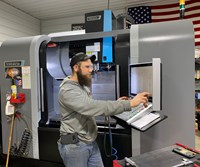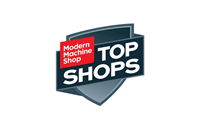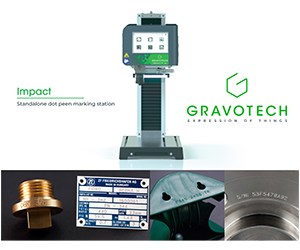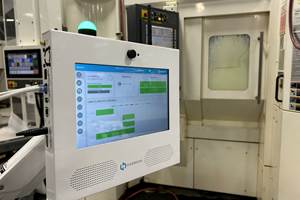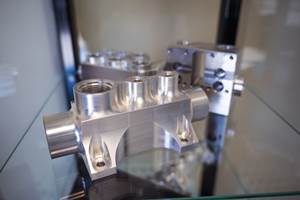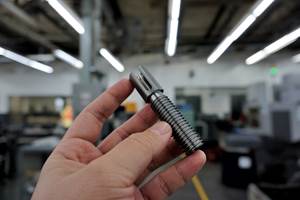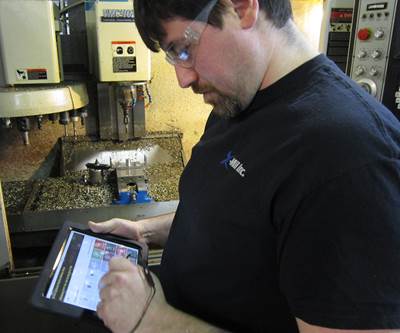Comparing ERP: Is the Cloud Right for You?
Make an informed decision by knowing the differences between onsite and cloud-based ERP systems.
While accounting applications and hard-copy documentation used to be the backbone of every shop, the benefits of enterprise resource planning (ERP) software has become apparent to most shop owners. As ERP solutions become more common, the question for many shop owners is not whether to get an ERP solution, but what kind to get. According to Shoptech, maker of E2 and E2 Shop, the advent of cloud technology focuses the discussion on that issue, forcing shop owners to weigh the benefits and drawbacks of both onsite and cloud-based ERP.
Buying onsite software means facing a larger upfront cost but requires less intensive internet access. Onsite systems demand access to secure servers that the shop owns and maintains. These servers store all relevant data, backing it up regularly. However, the cost of these servers can be daunting, and users will need a skilled IT department to maintain and upgrade the system when necessary. Providers may service the software, but the cost of the servers will still fall on the buyer. That said, locations without high-speed-internet connectivity can still benefit from ERP software through these onsite installations.
Rather than installing the servers in house, cloud-based ERP handles the data management online through a browser- or app-based interface. This approach contrasts with its onsite counterpart by enabling the shop owner to take a hands-off approach to managing the system. Downloads and updates are no longer necessary, as the software is accessed through a web browser, meaning no servers, no IT costs and no need to manage the system itself. The provider handles the logistical maintenance of the platform, freeing users to spend time on their projects.
Additionally, cloud-based ERP offers flexibility to shop owners by enabling mobile access to the company’s data. As the system is cloud-based, any data input through one device updates on all devices automatically. If the shop keeps tablets or mobile devices on the shop floor, every worker will be aware of any updates to CAD files and schedules immediately. With Shoptech, each user has a password that grants access to allowed areas of the shop’s ERP system. Further benefits lie in the mobility, as internet-connected mobile device with security clearance can access ERP data, enabling shop management to schedule jobs, quote customers and place orders from anywhere with internet access.
Security is often a concern for data-management systems, and ERP is no different. While many manufacturers might balk at the idea of trusting secure data to an online server, companies like Shoptech invest tremendous resources into making their customers’ data secure. Shoptech, for example, employs Rackspace, an independent IT security firm that dedicates its resources to data maintenance and security. For comparison, onsite servers demand that shop owners invest in their own security. A shop owner who skimps on IT protections eventually will run into trouble, but someone who invests in reasonable security measures will see their data safe.
Ultimately, cloud-based ERP has numerous advantages that onsite systems simply cannot compete with, as the connectivity and hands-off maintenance are significant improvements to the user experience. However, with high-speed-internet access in limited availability throughout many parts of the United States, onsite ERP will continue to be important to many machine shops. Just remember to protect your servers with skilled IT professionals.
Related Content
Can Connecting ERP to Machine Tool Monitoring Address the Workforce Challenge?
It can if RFID tags are added. Here is how this startup sees a local Internet of Things aiding CNC machine shops.
Read MoreShop Moves to Aerospace Machining With Help From ERP
Coastal Machine is an oil and gas shop that pivoted to aerospace manufacturing with the help of an ERP system that made the certification process simple.
Read MoreIncrease Savings and Streamline Purchasing Operations with Amazon Business
Machine shops and small manufacturers are finding cost and time savings using Amazon Business in their shops.
Read MoreWhen Handing Down the Family Machine Shop is as Complex as a Swiss-Turned Part
The transition into Swiss-type machining at Deking Screw Products required more than just a shift in production operations. It required a new mindset and a new way of running the family-owned business. Hardest of all, it required that one generation let go, and allow a new one to step in.
Read MoreRead Next
Cloud-Based ERP Consolidates Quoting, Enables Mobile Management
E2 Shop cloud-based enterprise resource planning software from Shoptech improved the quoting process at an Ohio machine shop and enabled off-site management.
Read MoreThe Cut Scene: The Finer Details of Large-Format Machining
Small details and features can have an outsized impact on large parts, such as Barbco’s collapsible utility drill head.
Read More3 Mistakes That Cause CNC Programs to Fail
Despite enhancements to manufacturing technology, there are still issues today that can cause programs to fail. These failures can cause lost time, scrapped parts, damaged machines and even injured operators.
Read More




